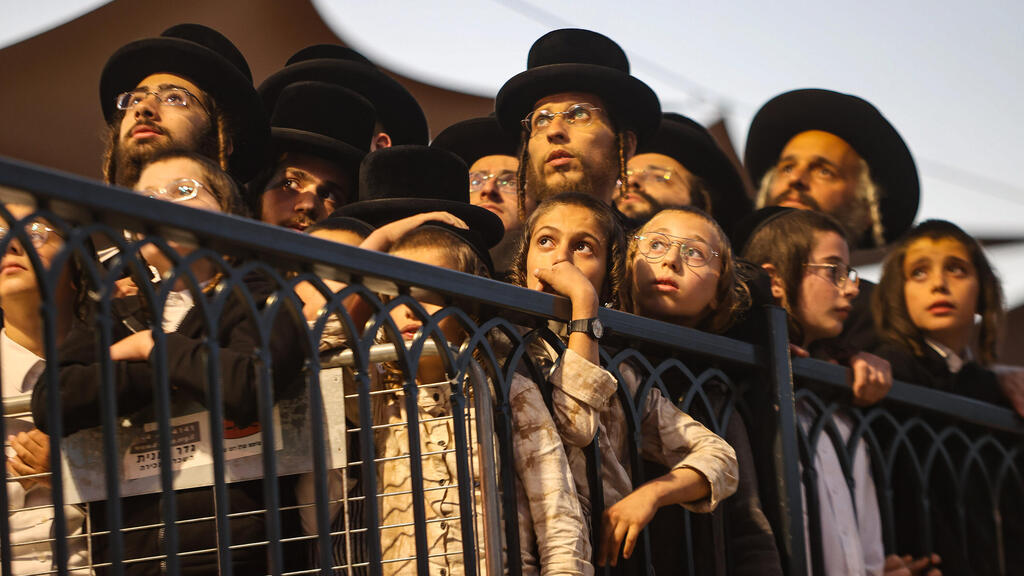And again, the same old tune, the melody of the ultra-Orthodox education system plays. It's the classic chorus we all know: the ultra-Orthodox parties want education budgets for their electorate, which leads to public outcry over funds for institutions that don't teach core subjects. This is an expected scenario, similar to the outcomes of elections in Syria.
Read more:
Only this time, something feels different. The notes may be familiar, but the melody is unlike. The current protest against the budgets for ultra-Orthodox education is growing in a different climate than before. Thanks to judicial reform, the social issue in Israel is reopened, and so is the issue with ultra-Orthodox society. And if we're already reopening it, it's not just to argue about budgets again.
There's a different event here. It's not just about funds. While it's convenient to present the struggle as such, it is more complex. It questions the legitimacy of ultra-Orthodox society and its way of life. The budget is just a facade. The opposition to it, along with the protests against the ultra-Orthodox and the rise of hatred toward them even before the budget issue made headlines, covers a larger question: Is the ultra-Orthodox way of life not legitimate in Israel in 2023? Does it even have a place in society? Can the secular and ultra-Orthodox worldviews coexist and share a common space?
The answers should address the essence, the bigger picture. Specific focus on one budget or another will miss the point because it doesn't answer the fundamental question – whether the protest, often directed against the ultra-Orthodox, challenges the very existence of the ultra-Orthodox way of life, perceived as fanatic and outdated. In my opinion, the answer to that is affirmative. Someone who is legitimate – we engage in dialogue with them; someone who is not legitimate - we protest against them. And against the ultra-Orthodox, we protest.
If this assumption is correct, and the budget is just a small chapter in a larger story, we are left to answer the main question: Can our ultra-Orthodox way of life be legitimate in the new social space that is being created despite the disagreement about it? Here too, in my opinion, the answer is affirmative.
The ultra-Orthodox represent a worldview that connects the past and the present. According to this perspective, if the right to our existence as a people in Israel is based on the promises of the Bible, there is no reason to take only the prize without fulfilling the conditions it sets for its acceptance.
From our perspective, the commitment to the Torah, its study, and the observance it entails come as a package deal with its promises regarding the land. They cannot be separated. Faced with strong and influential streams that emphasize the "tolerance" of religion, including a desire for its complete disappearance, the ultra-Orthodox stream stands firm, presenting an uncompromising worldview.
Facing any group with a specific ideology there is a group with an opposing ideology that balances it out. We wouldn't want a country where everyone sees, thinks and lives the same way. Diverse opinions are what make the world more balanced. Nobel laureate Elie Wiesel wrote in his book "The Soul of the Talmud" that "tolerance is not the abandonment of principles but the granting of space for every strand."
Despite being a sharp critic of fanaticism, he did not dismiss it when it touched upon "dangerous and enduring relinquishment," in his words. He believed that without the firm stance of the House of Shammai (a Jewish school of thought) on their truth, who knows where society would have deteriorated.
One can perceive extreme ultra-Orthodox individuals as easy targets for hatred, but it is also possible to offer an alternative view: to see them as an important voice that opposes the erosion of values, rejects boundless permissiveness, and seeks to preserve Jewish identity out of unwavering faith that without a firm foundation, it is difficult to build the future. In the face of extreme Western ideologies that undermine the familiar order and create confusion, they provide a counterbalancing conservative force. It is not fanaticism.
If we want to achieve harmony, there are voices that must not be dismissed. Yes, such opinions – even if they do not always align with the accepted thinking in the liberal world – should have a place.
Facing any group with a specific ideology there is a group with an opposing ideology that balances it out. We wouldn't want a country where everyone sees, think and lives the same way. Diverse opinions are what make the world more balanced. Nobel laureate Elie Wiesel wrote in his book "The Soul of the Talmud" that "tolerance is not the abandonment of principles but the granting of space for every strand."
Yakov Plevinsky is a journalist at the Haredi weekly magazine Mishpacha.



